Leadership and Management for Service Industry: Hilton London
VerifiedAdded on 2022/11/24
|10
|3512
|270
Report
AI Summary
This report provides a comprehensive analysis of leadership and management within the service industry, using the Hilton London as a focal point. It begins by exploring classical management theories and their application in the hospitality sector, followed by an examination of leadership roles and styles relevant to the hotel. The report delves into sustainable management practices and leadership styles, contrasting them and highlighting their merits and demerits. It identifies factors impacting sustainable leadership, analyzes influences on organizational structure and sustainability within the hospitality industry, and critically assesses changes in management styles related to sustainable tourism strategies. The report concludes by evaluating essential hard and soft skills for the service sector, discussing future skill requirements, and emphasizing the importance of sustainable management and leadership skills within the context of sustainable tourism.
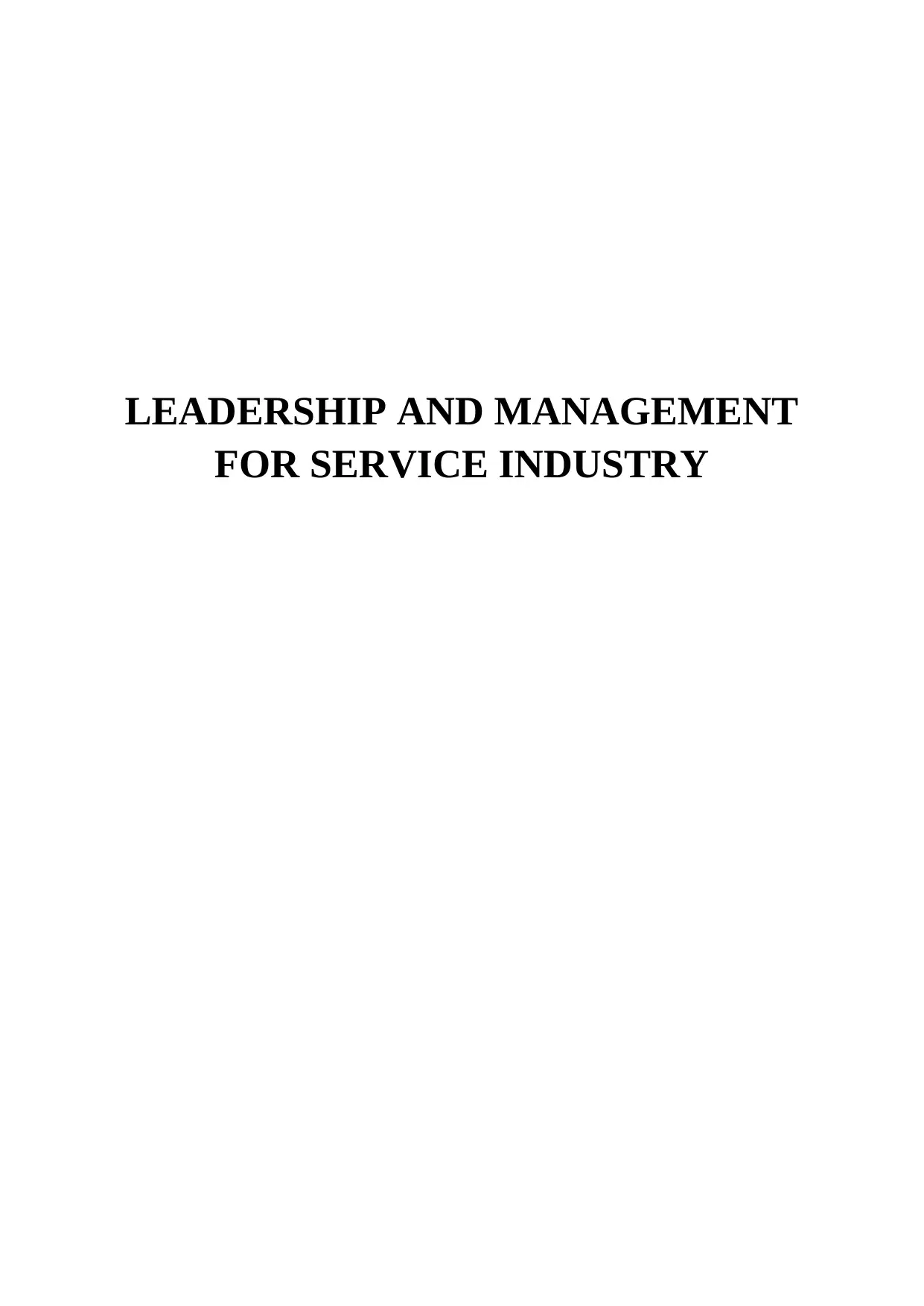
LEADERSHIP AND MANAGEMENT
FOR SERVICE INDUSTRY
FOR SERVICE INDUSTRY
Paraphrase This Document
Need a fresh take? Get an instant paraphrase of this document with our AI Paraphraser
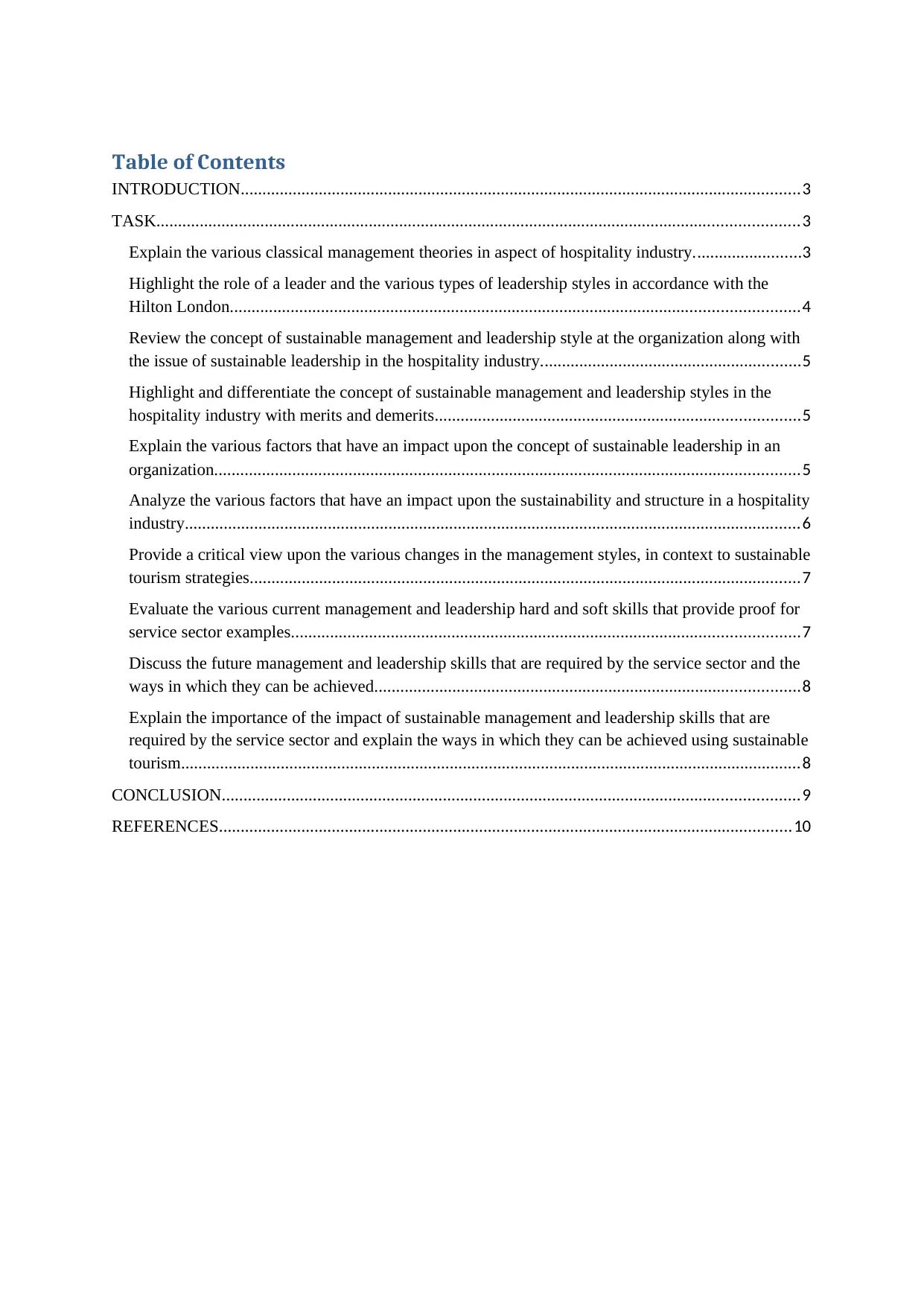
Table of Contents
INTRODUCTION.................................................................................................................................3
TASK....................................................................................................................................................3
Explain the various classical management theories in aspect of hospitality industry.........................3
Highlight the role of a leader and the various types of leadership styles in accordance with the
Hilton London...................................................................................................................................4
Review the concept of sustainable management and leadership style at the organization along with
the issue of sustainable leadership in the hospitality industry............................................................5
Highlight and differentiate the concept of sustainable management and leadership styles in the
hospitality industry with merits and demerits....................................................................................5
Explain the various factors that have an impact upon the concept of sustainable leadership in an
organization.......................................................................................................................................5
Analyze the various factors that have an impact upon the sustainability and structure in a hospitality
industry..............................................................................................................................................6
Provide a critical view upon the various changes in the management styles, in context to sustainable
tourism strategies...............................................................................................................................7
Evaluate the various current management and leadership hard and soft skills that provide proof for
service sector examples.....................................................................................................................7
Discuss the future management and leadership skills that are required by the service sector and the
ways in which they can be achieved..................................................................................................8
Explain the importance of the impact of sustainable management and leadership skills that are
required by the service sector and explain the ways in which they can be achieved using sustainable
tourism...............................................................................................................................................8
CONCLUSION.....................................................................................................................................9
REFERENCES....................................................................................................................................10
INTRODUCTION.................................................................................................................................3
TASK....................................................................................................................................................3
Explain the various classical management theories in aspect of hospitality industry.........................3
Highlight the role of a leader and the various types of leadership styles in accordance with the
Hilton London...................................................................................................................................4
Review the concept of sustainable management and leadership style at the organization along with
the issue of sustainable leadership in the hospitality industry............................................................5
Highlight and differentiate the concept of sustainable management and leadership styles in the
hospitality industry with merits and demerits....................................................................................5
Explain the various factors that have an impact upon the concept of sustainable leadership in an
organization.......................................................................................................................................5
Analyze the various factors that have an impact upon the sustainability and structure in a hospitality
industry..............................................................................................................................................6
Provide a critical view upon the various changes in the management styles, in context to sustainable
tourism strategies...............................................................................................................................7
Evaluate the various current management and leadership hard and soft skills that provide proof for
service sector examples.....................................................................................................................7
Discuss the future management and leadership skills that are required by the service sector and the
ways in which they can be achieved..................................................................................................8
Explain the importance of the impact of sustainable management and leadership skills that are
required by the service sector and explain the ways in which they can be achieved using sustainable
tourism...............................................................................................................................................8
CONCLUSION.....................................................................................................................................9
REFERENCES....................................................................................................................................10
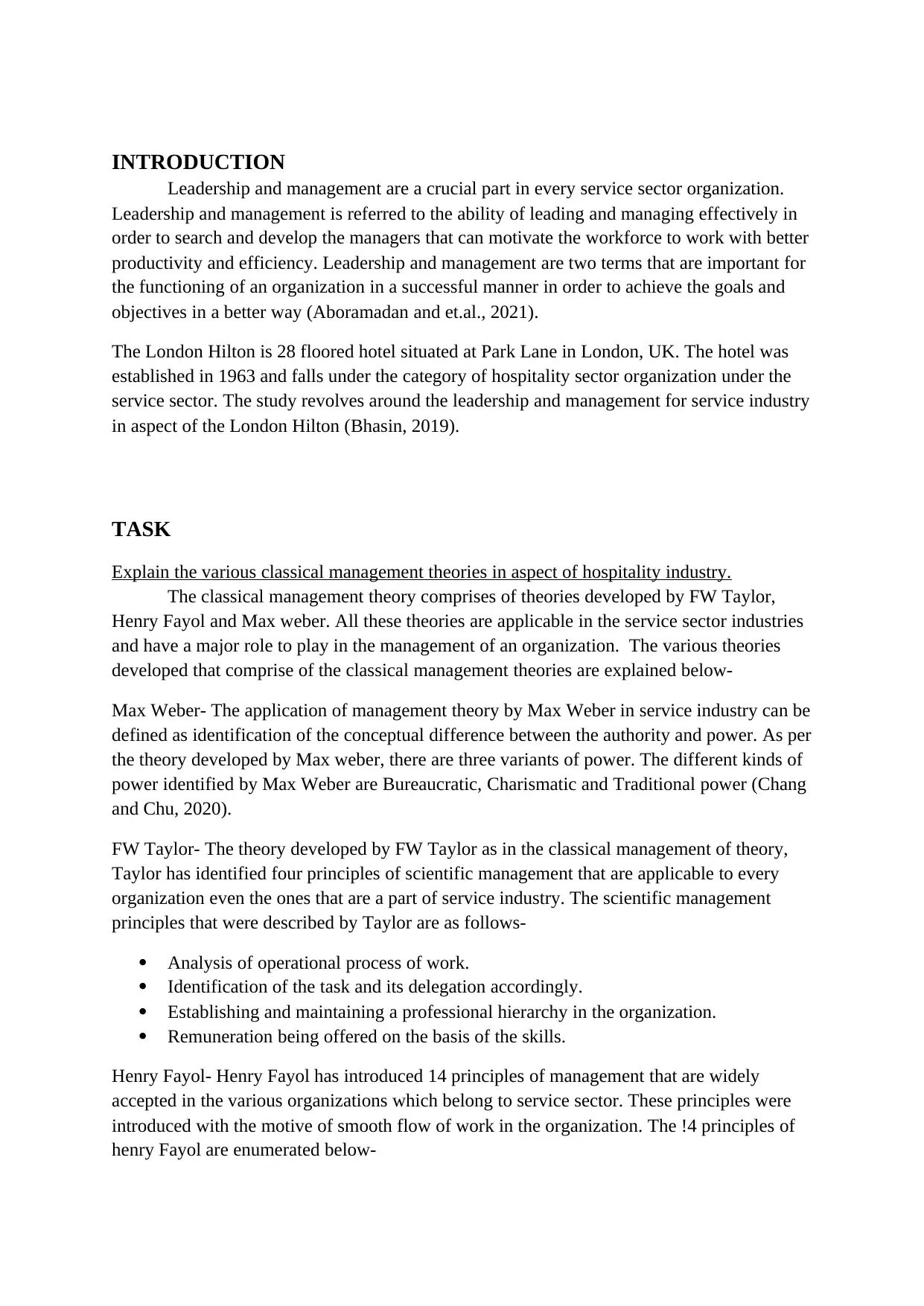
INTRODUCTION
Leadership and management are a crucial part in every service sector organization.
Leadership and management is referred to the ability of leading and managing effectively in
order to search and develop the managers that can motivate the workforce to work with better
productivity and efficiency. Leadership and management are two terms that are important for
the functioning of an organization in a successful manner in order to achieve the goals and
objectives in a better way (Aboramadan and et.al., 2021).
The London Hilton is 28 floored hotel situated at Park Lane in London, UK. The hotel was
established in 1963 and falls under the category of hospitality sector organization under the
service sector. The study revolves around the leadership and management for service industry
in aspect of the London Hilton (Bhasin, 2019).
TASK
Explain the various classical management theories in aspect of hospitality industry.
The classical management theory comprises of theories developed by FW Taylor,
Henry Fayol and Max weber. All these theories are applicable in the service sector industries
and have a major role to play in the management of an organization. The various theories
developed that comprise of the classical management theories are explained below-
Max Weber- The application of management theory by Max Weber in service industry can be
defined as identification of the conceptual difference between the authority and power. As per
the theory developed by Max weber, there are three variants of power. The different kinds of
power identified by Max Weber are Bureaucratic, Charismatic and Traditional power (Chang
and Chu, 2020).
FW Taylor- The theory developed by FW Taylor as in the classical management of theory,
Taylor has identified four principles of scientific management that are applicable to every
organization even the ones that are a part of service industry. The scientific management
principles that were described by Taylor are as follows-
Analysis of operational process of work.
Identification of the task and its delegation accordingly.
Establishing and maintaining a professional hierarchy in the organization.
Remuneration being offered on the basis of the skills.
Henry Fayol- Henry Fayol has introduced 14 principles of management that are widely
accepted in the various organizations which belong to service sector. These principles were
introduced with the motive of smooth flow of work in the organization. The !4 principles of
henry Fayol are enumerated below-
Leadership and management are a crucial part in every service sector organization.
Leadership and management is referred to the ability of leading and managing effectively in
order to search and develop the managers that can motivate the workforce to work with better
productivity and efficiency. Leadership and management are two terms that are important for
the functioning of an organization in a successful manner in order to achieve the goals and
objectives in a better way (Aboramadan and et.al., 2021).
The London Hilton is 28 floored hotel situated at Park Lane in London, UK. The hotel was
established in 1963 and falls under the category of hospitality sector organization under the
service sector. The study revolves around the leadership and management for service industry
in aspect of the London Hilton (Bhasin, 2019).
TASK
Explain the various classical management theories in aspect of hospitality industry.
The classical management theory comprises of theories developed by FW Taylor,
Henry Fayol and Max weber. All these theories are applicable in the service sector industries
and have a major role to play in the management of an organization. The various theories
developed that comprise of the classical management theories are explained below-
Max Weber- The application of management theory by Max Weber in service industry can be
defined as identification of the conceptual difference between the authority and power. As per
the theory developed by Max weber, there are three variants of power. The different kinds of
power identified by Max Weber are Bureaucratic, Charismatic and Traditional power (Chang
and Chu, 2020).
FW Taylor- The theory developed by FW Taylor as in the classical management of theory,
Taylor has identified four principles of scientific management that are applicable to every
organization even the ones that are a part of service industry. The scientific management
principles that were described by Taylor are as follows-
Analysis of operational process of work.
Identification of the task and its delegation accordingly.
Establishing and maintaining a professional hierarchy in the organization.
Remuneration being offered on the basis of the skills.
Henry Fayol- Henry Fayol has introduced 14 principles of management that are widely
accepted in the various organizations which belong to service sector. These principles were
introduced with the motive of smooth flow of work in the organization. The !4 principles of
henry Fayol are enumerated below-
⊘ This is a preview!⊘
Do you want full access?
Subscribe today to unlock all pages.

Trusted by 1+ million students worldwide
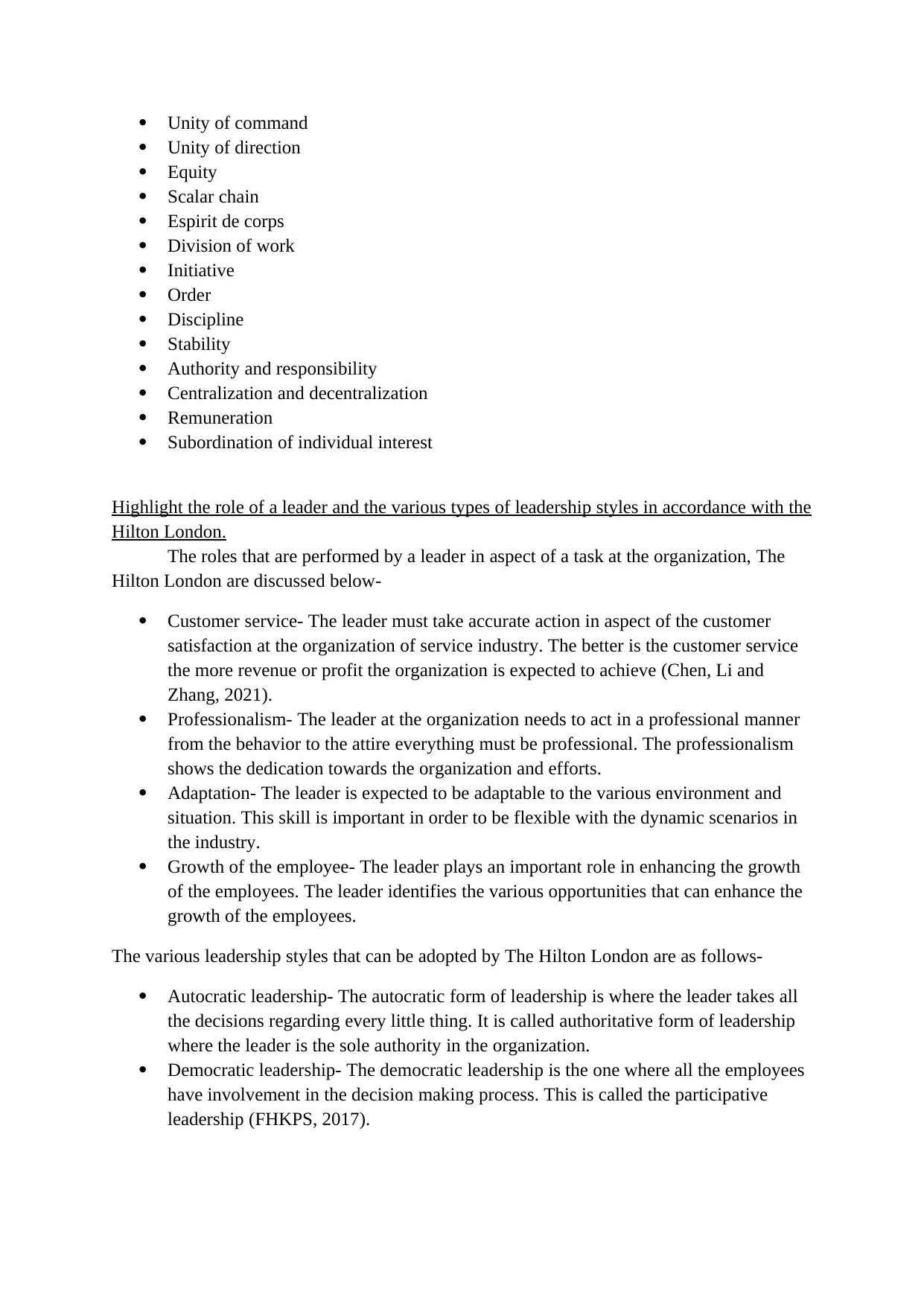
Unity of command
Unity of direction
Equity
Scalar chain
Espirit de corps
Division of work
Initiative
Order
Discipline
Stability
Authority and responsibility
Centralization and decentralization
Remuneration
Subordination of individual interest
Highlight the role of a leader and the various types of leadership styles in accordance with the
Hilton London.
The roles that are performed by a leader in aspect of a task at the organization, The
Hilton London are discussed below-
Customer service- The leader must take accurate action in aspect of the customer
satisfaction at the organization of service industry. The better is the customer service
the more revenue or profit the organization is expected to achieve (Chen, Li and
Zhang, 2021).
Professionalism- The leader at the organization needs to act in a professional manner
from the behavior to the attire everything must be professional. The professionalism
shows the dedication towards the organization and efforts.
Adaptation- The leader is expected to be adaptable to the various environment and
situation. This skill is important in order to be flexible with the dynamic scenarios in
the industry.
Growth of the employee- The leader plays an important role in enhancing the growth
of the employees. The leader identifies the various opportunities that can enhance the
growth of the employees.
The various leadership styles that can be adopted by The Hilton London are as follows-
Autocratic leadership- The autocratic form of leadership is where the leader takes all
the decisions regarding every little thing. It is called authoritative form of leadership
where the leader is the sole authority in the organization.
Democratic leadership- The democratic leadership is the one where all the employees
have involvement in the decision making process. This is called the participative
leadership (FHKPS, 2017).
Unity of direction
Equity
Scalar chain
Espirit de corps
Division of work
Initiative
Order
Discipline
Stability
Authority and responsibility
Centralization and decentralization
Remuneration
Subordination of individual interest
Highlight the role of a leader and the various types of leadership styles in accordance with the
Hilton London.
The roles that are performed by a leader in aspect of a task at the organization, The
Hilton London are discussed below-
Customer service- The leader must take accurate action in aspect of the customer
satisfaction at the organization of service industry. The better is the customer service
the more revenue or profit the organization is expected to achieve (Chen, Li and
Zhang, 2021).
Professionalism- The leader at the organization needs to act in a professional manner
from the behavior to the attire everything must be professional. The professionalism
shows the dedication towards the organization and efforts.
Adaptation- The leader is expected to be adaptable to the various environment and
situation. This skill is important in order to be flexible with the dynamic scenarios in
the industry.
Growth of the employee- The leader plays an important role in enhancing the growth
of the employees. The leader identifies the various opportunities that can enhance the
growth of the employees.
The various leadership styles that can be adopted by The Hilton London are as follows-
Autocratic leadership- The autocratic form of leadership is where the leader takes all
the decisions regarding every little thing. It is called authoritative form of leadership
where the leader is the sole authority in the organization.
Democratic leadership- The democratic leadership is the one where all the employees
have involvement in the decision making process. This is called the participative
leadership (FHKPS, 2017).
Paraphrase This Document
Need a fresh take? Get an instant paraphrase of this document with our AI Paraphraser
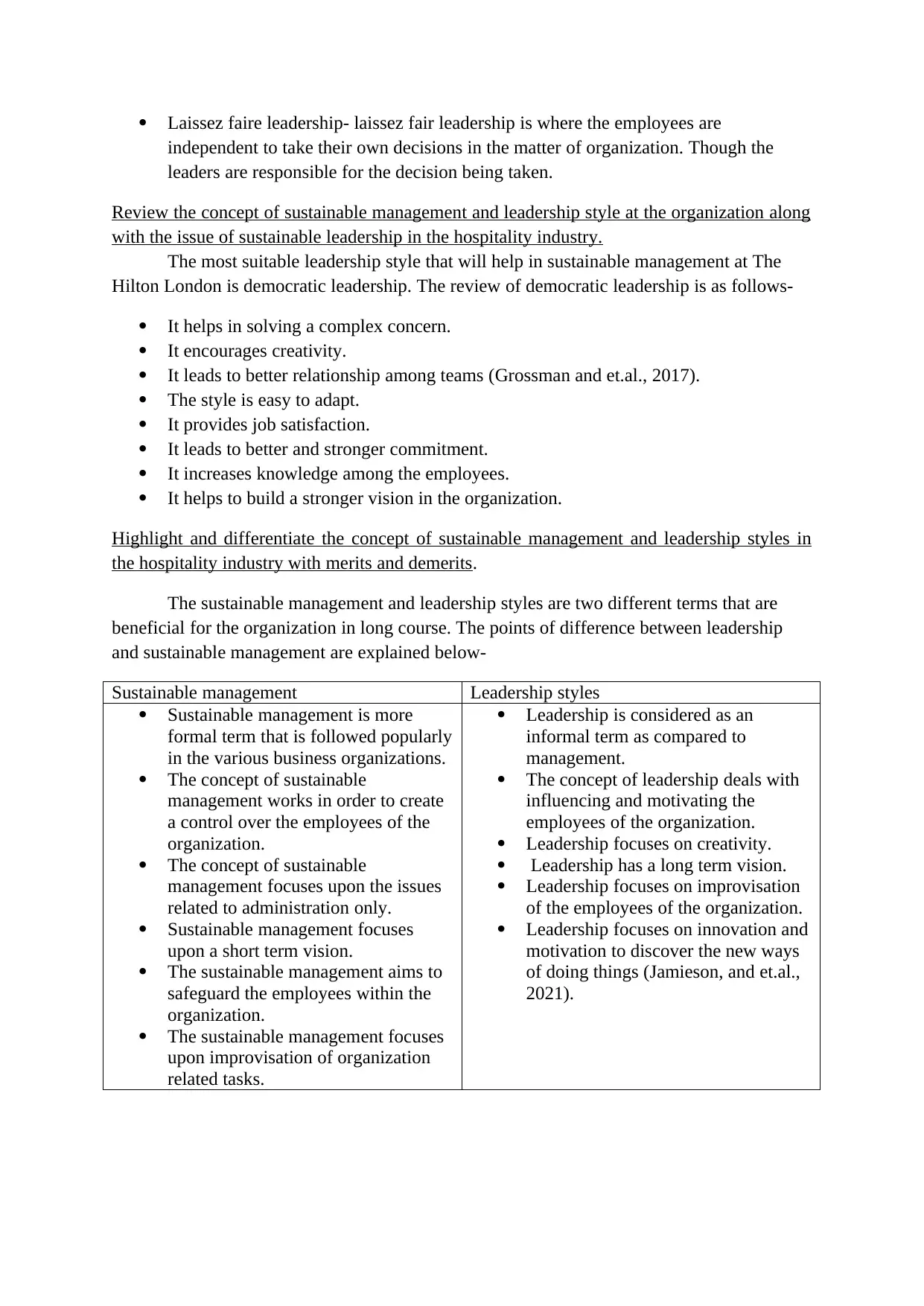
Laissez faire leadership- laissez fair leadership is where the employees are
independent to take their own decisions in the matter of organization. Though the
leaders are responsible for the decision being taken.
Review the concept of sustainable management and leadership style at the organization along
with the issue of sustainable leadership in the hospitality industry.
The most suitable leadership style that will help in sustainable management at The
Hilton London is democratic leadership. The review of democratic leadership is as follows-
It helps in solving a complex concern.
It encourages creativity.
It leads to better relationship among teams (Grossman and et.al., 2017).
The style is easy to adapt.
It provides job satisfaction.
It leads to better and stronger commitment.
It increases knowledge among the employees.
It helps to build a stronger vision in the organization.
Highlight and differentiate the concept of sustainable management and leadership styles in
the hospitality industry with merits and demerits.
The sustainable management and leadership styles are two different terms that are
beneficial for the organization in long course. The points of difference between leadership
and sustainable management are explained below-
Sustainable management Leadership styles
Sustainable management is more
formal term that is followed popularly
in the various business organizations.
The concept of sustainable
management works in order to create
a control over the employees of the
organization.
The concept of sustainable
management focuses upon the issues
related to administration only.
Sustainable management focuses
upon a short term vision.
The sustainable management aims to
safeguard the employees within the
organization.
The sustainable management focuses
upon improvisation of organization
related tasks.
Leadership is considered as an
informal term as compared to
management.
The concept of leadership deals with
influencing and motivating the
employees of the organization.
Leadership focuses on creativity.
Leadership has a long term vision.
Leadership focuses on improvisation
of the employees of the organization.
Leadership focuses on innovation and
motivation to discover the new ways
of doing things (Jamieson, and et.al.,
2021).
independent to take their own decisions in the matter of organization. Though the
leaders are responsible for the decision being taken.
Review the concept of sustainable management and leadership style at the organization along
with the issue of sustainable leadership in the hospitality industry.
The most suitable leadership style that will help in sustainable management at The
Hilton London is democratic leadership. The review of democratic leadership is as follows-
It helps in solving a complex concern.
It encourages creativity.
It leads to better relationship among teams (Grossman and et.al., 2017).
The style is easy to adapt.
It provides job satisfaction.
It leads to better and stronger commitment.
It increases knowledge among the employees.
It helps to build a stronger vision in the organization.
Highlight and differentiate the concept of sustainable management and leadership styles in
the hospitality industry with merits and demerits.
The sustainable management and leadership styles are two different terms that are
beneficial for the organization in long course. The points of difference between leadership
and sustainable management are explained below-
Sustainable management Leadership styles
Sustainable management is more
formal term that is followed popularly
in the various business organizations.
The concept of sustainable
management works in order to create
a control over the employees of the
organization.
The concept of sustainable
management focuses upon the issues
related to administration only.
Sustainable management focuses
upon a short term vision.
The sustainable management aims to
safeguard the employees within the
organization.
The sustainable management focuses
upon improvisation of organization
related tasks.
Leadership is considered as an
informal term as compared to
management.
The concept of leadership deals with
influencing and motivating the
employees of the organization.
Leadership focuses on creativity.
Leadership has a long term vision.
Leadership focuses on improvisation
of the employees of the organization.
Leadership focuses on innovation and
motivation to discover the new ways
of doing things (Jamieson, and et.al.,
2021).
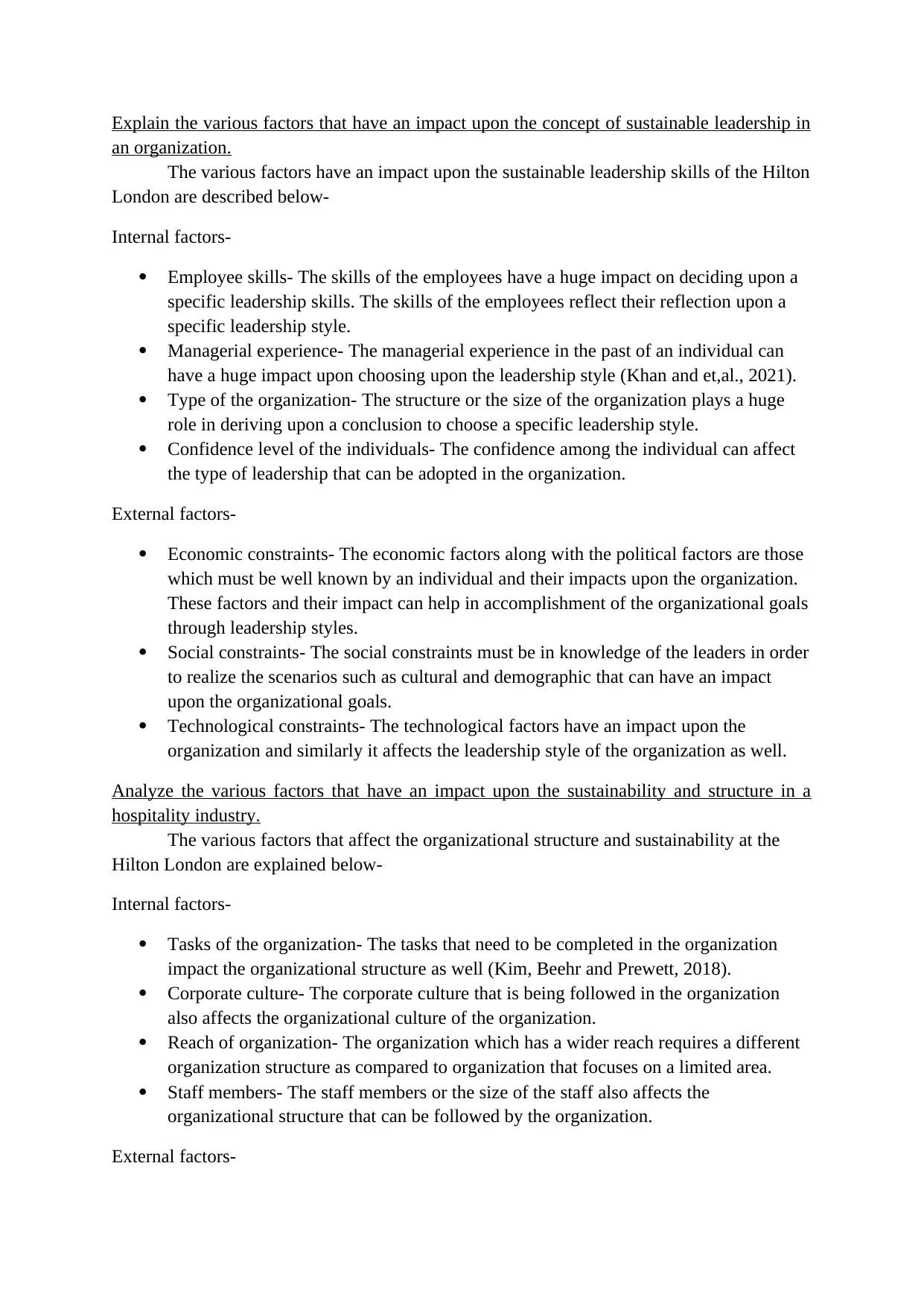
Explain the various factors that have an impact upon the concept of sustainable leadership in
an organization.
The various factors have an impact upon the sustainable leadership skills of the Hilton
London are described below-
Internal factors-
Employee skills- The skills of the employees have a huge impact on deciding upon a
specific leadership skills. The skills of the employees reflect their reflection upon a
specific leadership style.
Managerial experience- The managerial experience in the past of an individual can
have a huge impact upon choosing upon the leadership style (Khan and et,al., 2021).
Type of the organization- The structure or the size of the organization plays a huge
role in deriving upon a conclusion to choose a specific leadership style.
Confidence level of the individuals- The confidence among the individual can affect
the type of leadership that can be adopted in the organization.
External factors-
Economic constraints- The economic factors along with the political factors are those
which must be well known by an individual and their impacts upon the organization.
These factors and their impact can help in accomplishment of the organizational goals
through leadership styles.
Social constraints- The social constraints must be in knowledge of the leaders in order
to realize the scenarios such as cultural and demographic that can have an impact
upon the organizational goals.
Technological constraints- The technological factors have an impact upon the
organization and similarly it affects the leadership style of the organization as well.
Analyze the various factors that have an impact upon the sustainability and structure in a
hospitality industry.
The various factors that affect the organizational structure and sustainability at the
Hilton London are explained below-
Internal factors-
Tasks of the organization- The tasks that need to be completed in the organization
impact the organizational structure as well (Kim, Beehr and Prewett, 2018).
Corporate culture- The corporate culture that is being followed in the organization
also affects the organizational culture of the organization.
Reach of organization- The organization which has a wider reach requires a different
organization structure as compared to organization that focuses on a limited area.
Staff members- The staff members or the size of the staff also affects the
organizational structure that can be followed by the organization.
External factors-
an organization.
The various factors have an impact upon the sustainable leadership skills of the Hilton
London are described below-
Internal factors-
Employee skills- The skills of the employees have a huge impact on deciding upon a
specific leadership skills. The skills of the employees reflect their reflection upon a
specific leadership style.
Managerial experience- The managerial experience in the past of an individual can
have a huge impact upon choosing upon the leadership style (Khan and et,al., 2021).
Type of the organization- The structure or the size of the organization plays a huge
role in deriving upon a conclusion to choose a specific leadership style.
Confidence level of the individuals- The confidence among the individual can affect
the type of leadership that can be adopted in the organization.
External factors-
Economic constraints- The economic factors along with the political factors are those
which must be well known by an individual and their impacts upon the organization.
These factors and their impact can help in accomplishment of the organizational goals
through leadership styles.
Social constraints- The social constraints must be in knowledge of the leaders in order
to realize the scenarios such as cultural and demographic that can have an impact
upon the organizational goals.
Technological constraints- The technological factors have an impact upon the
organization and similarly it affects the leadership style of the organization as well.
Analyze the various factors that have an impact upon the sustainability and structure in a
hospitality industry.
The various factors that affect the organizational structure and sustainability at the
Hilton London are explained below-
Internal factors-
Tasks of the organization- The tasks that need to be completed in the organization
impact the organizational structure as well (Kim, Beehr and Prewett, 2018).
Corporate culture- The corporate culture that is being followed in the organization
also affects the organizational culture of the organization.
Reach of organization- The organization which has a wider reach requires a different
organization structure as compared to organization that focuses on a limited area.
Staff members- The staff members or the size of the staff also affects the
organizational structure that can be followed by the organization.
External factors-
⊘ This is a preview!⊘
Do you want full access?
Subscribe today to unlock all pages.

Trusted by 1+ million students worldwide
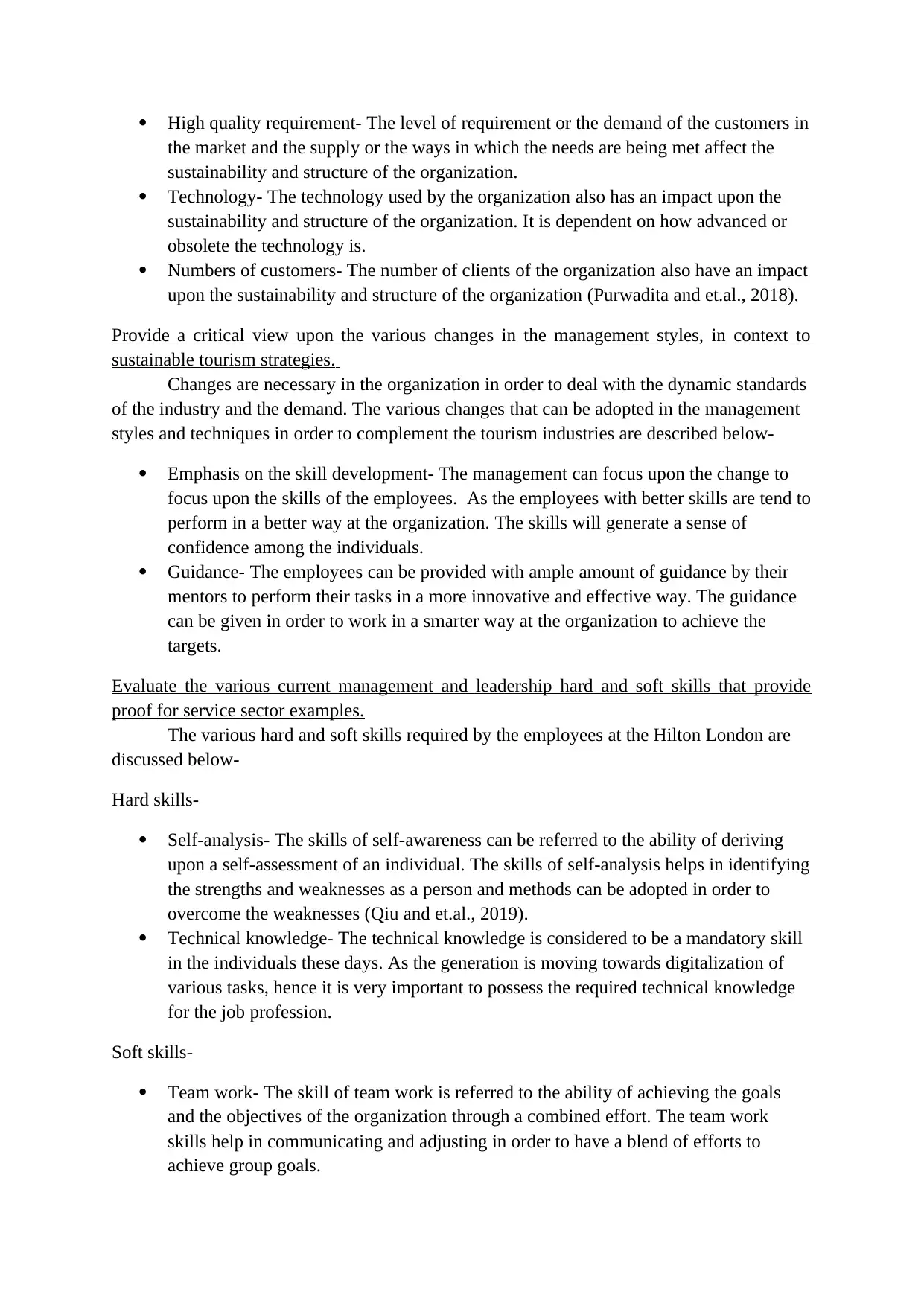
High quality requirement- The level of requirement or the demand of the customers in
the market and the supply or the ways in which the needs are being met affect the
sustainability and structure of the organization.
Technology- The technology used by the organization also has an impact upon the
sustainability and structure of the organization. It is dependent on how advanced or
obsolete the technology is.
Numbers of customers- The number of clients of the organization also have an impact
upon the sustainability and structure of the organization (Purwadita and et.al., 2018).
Provide a critical view upon the various changes in the management styles, in context to
sustainable tourism strategies.
Changes are necessary in the organization in order to deal with the dynamic standards
of the industry and the demand. The various changes that can be adopted in the management
styles and techniques in order to complement the tourism industries are described below-
Emphasis on the skill development- The management can focus upon the change to
focus upon the skills of the employees. As the employees with better skills are tend to
perform in a better way at the organization. The skills will generate a sense of
confidence among the individuals.
Guidance- The employees can be provided with ample amount of guidance by their
mentors to perform their tasks in a more innovative and effective way. The guidance
can be given in order to work in a smarter way at the organization to achieve the
targets.
Evaluate the various current management and leadership hard and soft skills that provide
proof for service sector examples.
The various hard and soft skills required by the employees at the Hilton London are
discussed below-
Hard skills-
Self-analysis- The skills of self-awareness can be referred to the ability of deriving
upon a self-assessment of an individual. The skills of self-analysis helps in identifying
the strengths and weaknesses as a person and methods can be adopted in order to
overcome the weaknesses (Qiu and et.al., 2019).
Technical knowledge- The technical knowledge is considered to be a mandatory skill
in the individuals these days. As the generation is moving towards digitalization of
various tasks, hence it is very important to possess the required technical knowledge
for the job profession.
Soft skills-
Team work- The skill of team work is referred to the ability of achieving the goals
and the objectives of the organization through a combined effort. The team work
skills help in communicating and adjusting in order to have a blend of efforts to
achieve group goals.
the market and the supply or the ways in which the needs are being met affect the
sustainability and structure of the organization.
Technology- The technology used by the organization also has an impact upon the
sustainability and structure of the organization. It is dependent on how advanced or
obsolete the technology is.
Numbers of customers- The number of clients of the organization also have an impact
upon the sustainability and structure of the organization (Purwadita and et.al., 2018).
Provide a critical view upon the various changes in the management styles, in context to
sustainable tourism strategies.
Changes are necessary in the organization in order to deal with the dynamic standards
of the industry and the demand. The various changes that can be adopted in the management
styles and techniques in order to complement the tourism industries are described below-
Emphasis on the skill development- The management can focus upon the change to
focus upon the skills of the employees. As the employees with better skills are tend to
perform in a better way at the organization. The skills will generate a sense of
confidence among the individuals.
Guidance- The employees can be provided with ample amount of guidance by their
mentors to perform their tasks in a more innovative and effective way. The guidance
can be given in order to work in a smarter way at the organization to achieve the
targets.
Evaluate the various current management and leadership hard and soft skills that provide
proof for service sector examples.
The various hard and soft skills required by the employees at the Hilton London are
discussed below-
Hard skills-
Self-analysis- The skills of self-awareness can be referred to the ability of deriving
upon a self-assessment of an individual. The skills of self-analysis helps in identifying
the strengths and weaknesses as a person and methods can be adopted in order to
overcome the weaknesses (Qiu and et.al., 2019).
Technical knowledge- The technical knowledge is considered to be a mandatory skill
in the individuals these days. As the generation is moving towards digitalization of
various tasks, hence it is very important to possess the required technical knowledge
for the job profession.
Soft skills-
Team work- The skill of team work is referred to the ability of achieving the goals
and the objectives of the organization through a combined effort. The team work
skills help in communicating and adjusting in order to have a blend of efforts to
achieve group goals.
Paraphrase This Document
Need a fresh take? Get an instant paraphrase of this document with our AI Paraphraser
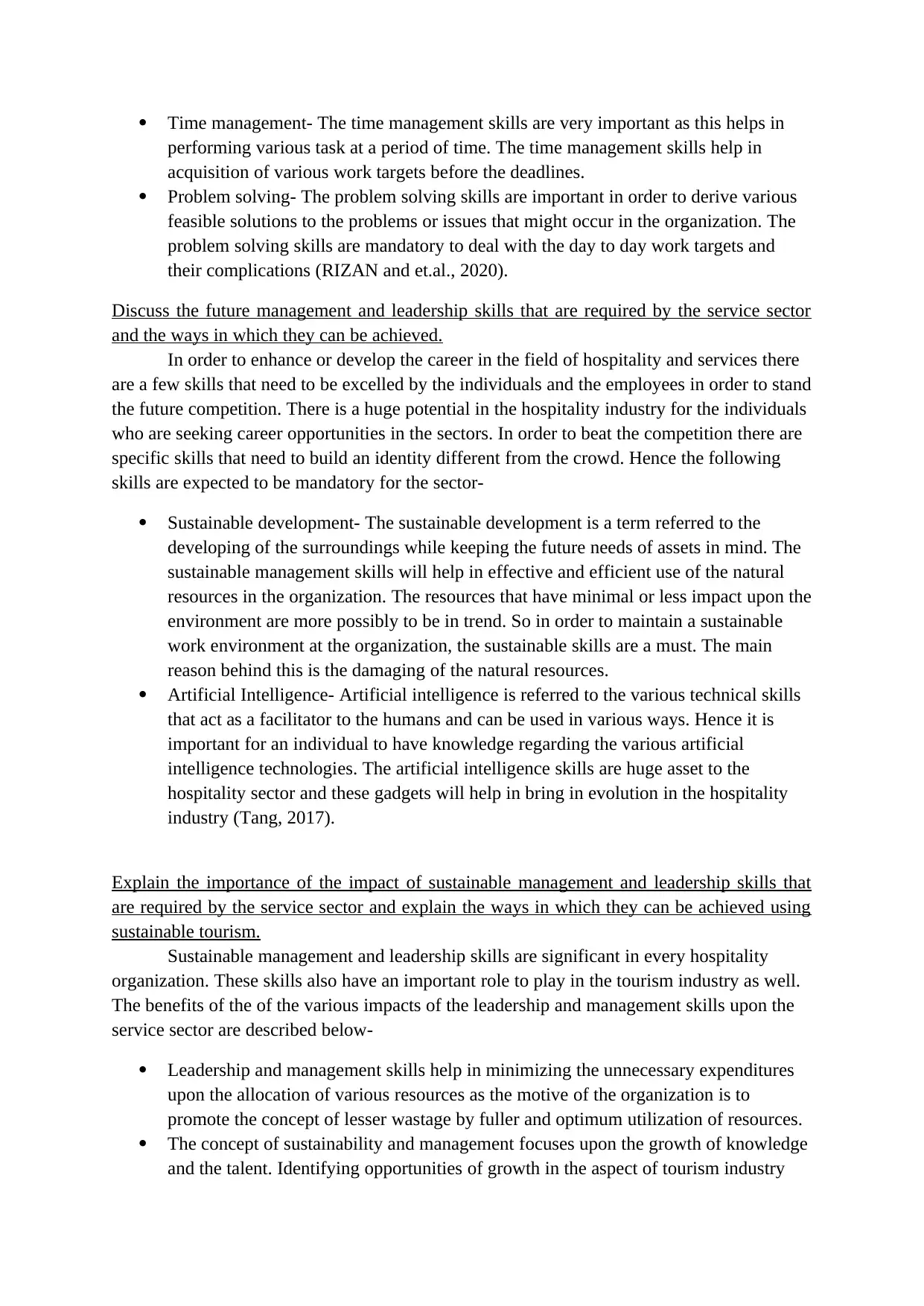
Time management- The time management skills are very important as this helps in
performing various task at a period of time. The time management skills help in
acquisition of various work targets before the deadlines.
Problem solving- The problem solving skills are important in order to derive various
feasible solutions to the problems or issues that might occur in the organization. The
problem solving skills are mandatory to deal with the day to day work targets and
their complications (RIZAN and et.al., 2020).
Discuss the future management and leadership skills that are required by the service sector
and the ways in which they can be achieved.
In order to enhance or develop the career in the field of hospitality and services there
are a few skills that need to be excelled by the individuals and the employees in order to stand
the future competition. There is a huge potential in the hospitality industry for the individuals
who are seeking career opportunities in the sectors. In order to beat the competition there are
specific skills that need to build an identity different from the crowd. Hence the following
skills are expected to be mandatory for the sector-
Sustainable development- The sustainable development is a term referred to the
developing of the surroundings while keeping the future needs of assets in mind. The
sustainable management skills will help in effective and efficient use of the natural
resources in the organization. The resources that have minimal or less impact upon the
environment are more possibly to be in trend. So in order to maintain a sustainable
work environment at the organization, the sustainable skills are a must. The main
reason behind this is the damaging of the natural resources.
Artificial Intelligence- Artificial intelligence is referred to the various technical skills
that act as a facilitator to the humans and can be used in various ways. Hence it is
important for an individual to have knowledge regarding the various artificial
intelligence technologies. The artificial intelligence skills are huge asset to the
hospitality sector and these gadgets will help in bring in evolution in the hospitality
industry (Tang, 2017).
Explain the importance of the impact of sustainable management and leadership skills that
are required by the service sector and explain the ways in which they can be achieved using
sustainable tourism.
Sustainable management and leadership skills are significant in every hospitality
organization. These skills also have an important role to play in the tourism industry as well.
The benefits of the of the various impacts of the leadership and management skills upon the
service sector are described below-
Leadership and management skills help in minimizing the unnecessary expenditures
upon the allocation of various resources as the motive of the organization is to
promote the concept of lesser wastage by fuller and optimum utilization of resources.
The concept of sustainability and management focuses upon the growth of knowledge
and the talent. Identifying opportunities of growth in the aspect of tourism industry
performing various task at a period of time. The time management skills help in
acquisition of various work targets before the deadlines.
Problem solving- The problem solving skills are important in order to derive various
feasible solutions to the problems or issues that might occur in the organization. The
problem solving skills are mandatory to deal with the day to day work targets and
their complications (RIZAN and et.al., 2020).
Discuss the future management and leadership skills that are required by the service sector
and the ways in which they can be achieved.
In order to enhance or develop the career in the field of hospitality and services there
are a few skills that need to be excelled by the individuals and the employees in order to stand
the future competition. There is a huge potential in the hospitality industry for the individuals
who are seeking career opportunities in the sectors. In order to beat the competition there are
specific skills that need to build an identity different from the crowd. Hence the following
skills are expected to be mandatory for the sector-
Sustainable development- The sustainable development is a term referred to the
developing of the surroundings while keeping the future needs of assets in mind. The
sustainable management skills will help in effective and efficient use of the natural
resources in the organization. The resources that have minimal or less impact upon the
environment are more possibly to be in trend. So in order to maintain a sustainable
work environment at the organization, the sustainable skills are a must. The main
reason behind this is the damaging of the natural resources.
Artificial Intelligence- Artificial intelligence is referred to the various technical skills
that act as a facilitator to the humans and can be used in various ways. Hence it is
important for an individual to have knowledge regarding the various artificial
intelligence technologies. The artificial intelligence skills are huge asset to the
hospitality sector and these gadgets will help in bring in evolution in the hospitality
industry (Tang, 2017).
Explain the importance of the impact of sustainable management and leadership skills that
are required by the service sector and explain the ways in which they can be achieved using
sustainable tourism.
Sustainable management and leadership skills are significant in every hospitality
organization. These skills also have an important role to play in the tourism industry as well.
The benefits of the of the various impacts of the leadership and management skills upon the
service sector are described below-
Leadership and management skills help in minimizing the unnecessary expenditures
upon the allocation of various resources as the motive of the organization is to
promote the concept of lesser wastage by fuller and optimum utilization of resources.
The concept of sustainability and management focuses upon the growth of knowledge
and the talent. Identifying opportunities of growth in the aspect of tourism industry
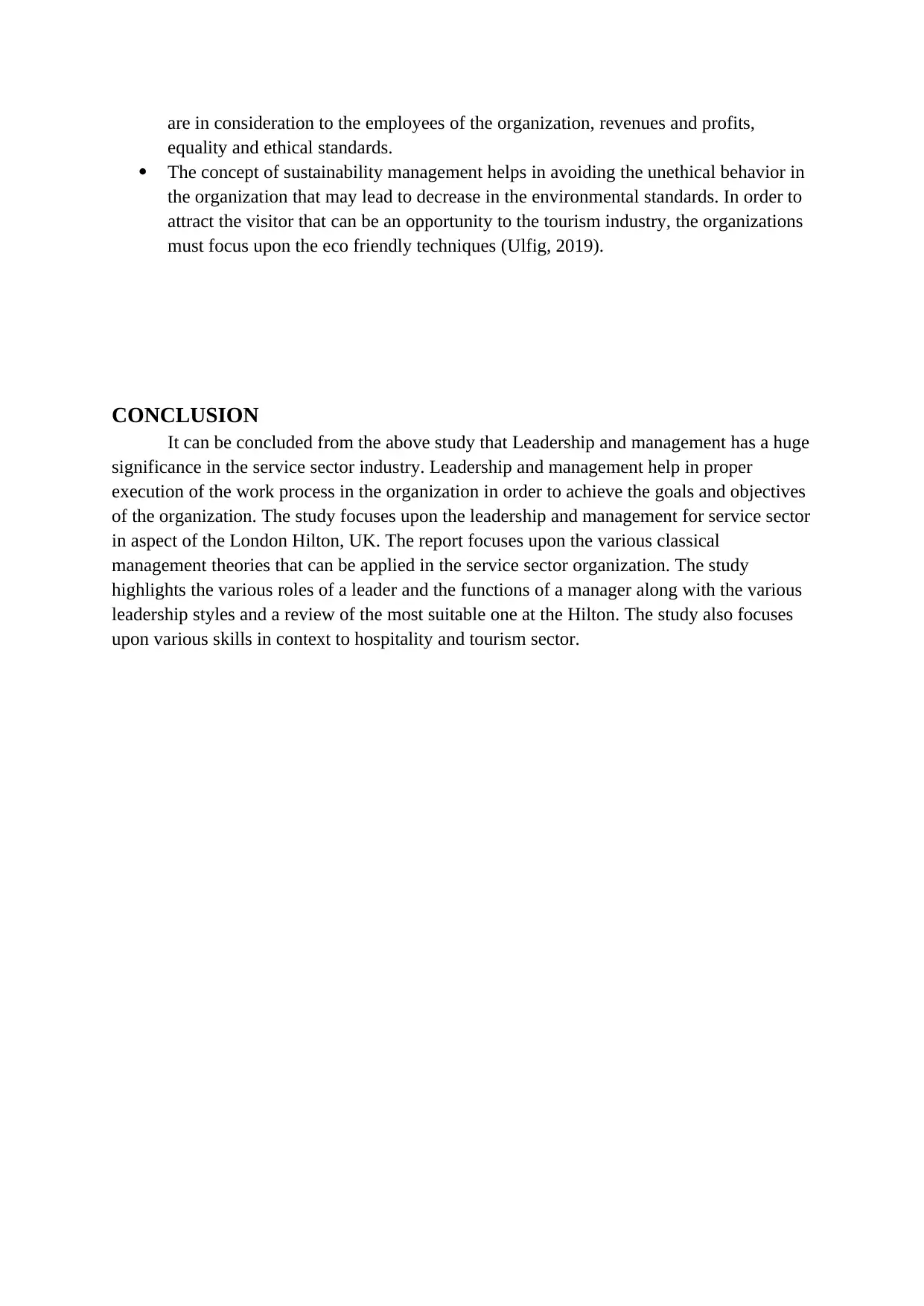
are in consideration to the employees of the organization, revenues and profits,
equality and ethical standards.
The concept of sustainability management helps in avoiding the unethical behavior in
the organization that may lead to decrease in the environmental standards. In order to
attract the visitor that can be an opportunity to the tourism industry, the organizations
must focus upon the eco friendly techniques (Ulfig, 2019).
CONCLUSION
It can be concluded from the above study that Leadership and management has a huge
significance in the service sector industry. Leadership and management help in proper
execution of the work process in the organization in order to achieve the goals and objectives
of the organization. The study focuses upon the leadership and management for service sector
in aspect of the London Hilton, UK. The report focuses upon the various classical
management theories that can be applied in the service sector organization. The study
highlights the various roles of a leader and the functions of a manager along with the various
leadership styles and a review of the most suitable one at the Hilton. The study also focuses
upon various skills in context to hospitality and tourism sector.
equality and ethical standards.
The concept of sustainability management helps in avoiding the unethical behavior in
the organization that may lead to decrease in the environmental standards. In order to
attract the visitor that can be an opportunity to the tourism industry, the organizations
must focus upon the eco friendly techniques (Ulfig, 2019).
CONCLUSION
It can be concluded from the above study that Leadership and management has a huge
significance in the service sector industry. Leadership and management help in proper
execution of the work process in the organization in order to achieve the goals and objectives
of the organization. The study focuses upon the leadership and management for service sector
in aspect of the London Hilton, UK. The report focuses upon the various classical
management theories that can be applied in the service sector organization. The study
highlights the various roles of a leader and the functions of a manager along with the various
leadership styles and a review of the most suitable one at the Hilton. The study also focuses
upon various skills in context to hospitality and tourism sector.
⊘ This is a preview!⊘
Do you want full access?
Subscribe today to unlock all pages.

Trusted by 1+ million students worldwide
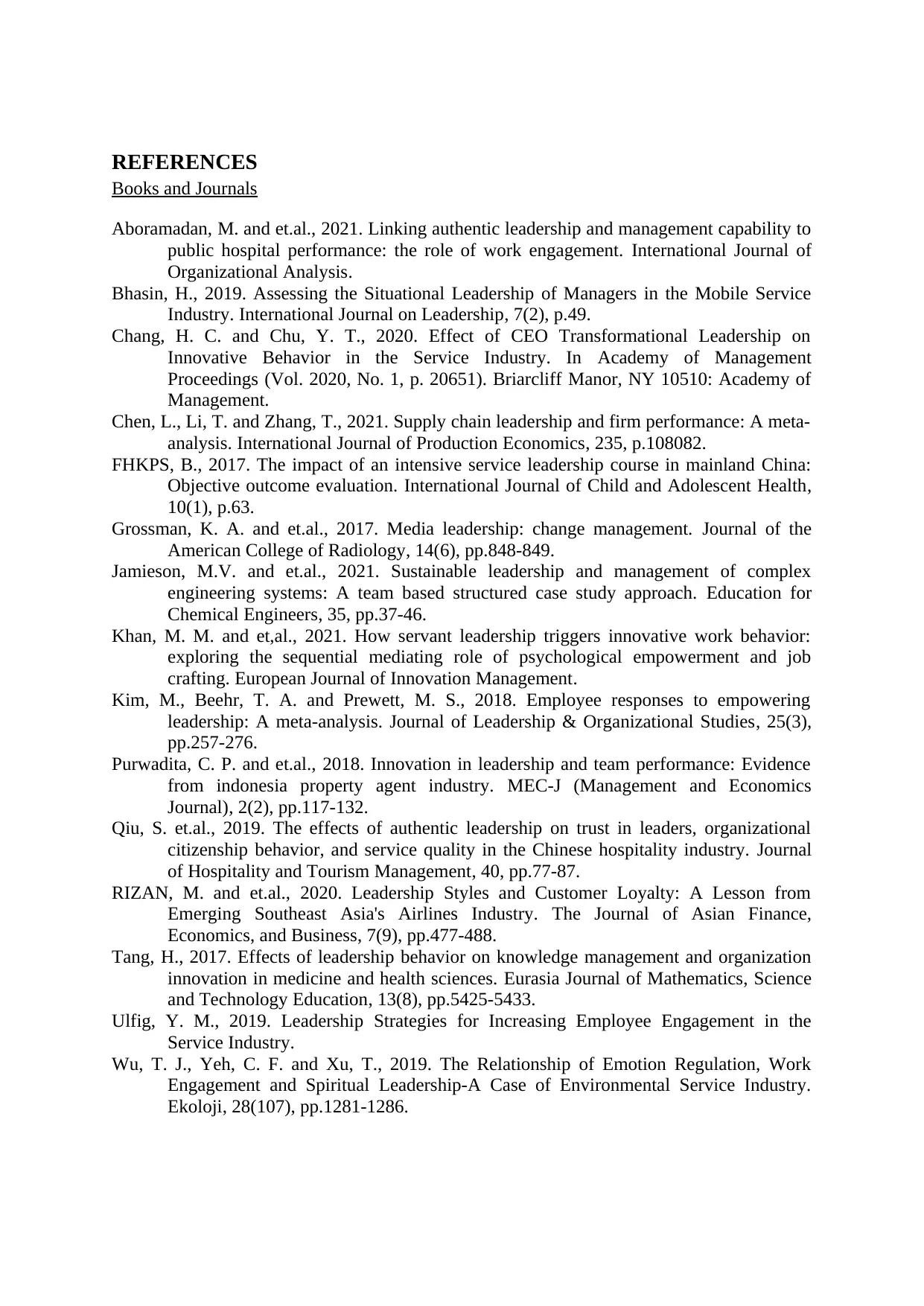
REFERENCES
Books and Journals
Aboramadan, M. and et.al., 2021. Linking authentic leadership and management capability to
public hospital performance: the role of work engagement. International Journal of
Organizational Analysis.
Bhasin, H., 2019. Assessing the Situational Leadership of Managers in the Mobile Service
Industry. International Journal on Leadership, 7(2), p.49.
Chang, H. C. and Chu, Y. T., 2020. Effect of CEO Transformational Leadership on
Innovative Behavior in the Service Industry. In Academy of Management
Proceedings (Vol. 2020, No. 1, p. 20651). Briarcliff Manor, NY 10510: Academy of
Management.
Chen, L., Li, T. and Zhang, T., 2021. Supply chain leadership and firm performance: A meta-
analysis. International Journal of Production Economics, 235, p.108082.
FHKPS, B., 2017. The impact of an intensive service leadership course in mainland China:
Objective outcome evaluation. International Journal of Child and Adolescent Health,
10(1), p.63.
Grossman, K. A. and et.al., 2017. Media leadership: change management. Journal of the
American College of Radiology, 14(6), pp.848-849.
Jamieson, M.V. and et.al., 2021. Sustainable leadership and management of complex
engineering systems: A team based structured case study approach. Education for
Chemical Engineers, 35, pp.37-46.
Khan, M. M. and et,al., 2021. How servant leadership triggers innovative work behavior:
exploring the sequential mediating role of psychological empowerment and job
crafting. European Journal of Innovation Management.
Kim, M., Beehr, T. A. and Prewett, M. S., 2018. Employee responses to empowering
leadership: A meta-analysis. Journal of Leadership & Organizational Studies, 25(3),
pp.257-276.
Purwadita, C. P. and et.al., 2018. Innovation in leadership and team performance: Evidence
from indonesia property agent industry. MEC-J (Management and Economics
Journal), 2(2), pp.117-132.
Qiu, S. et.al., 2019. The effects of authentic leadership on trust in leaders, organizational
citizenship behavior, and service quality in the Chinese hospitality industry. Journal
of Hospitality and Tourism Management, 40, pp.77-87.
RIZAN, M. and et.al., 2020. Leadership Styles and Customer Loyalty: A Lesson from
Emerging Southeast Asia's Airlines Industry. The Journal of Asian Finance,
Economics, and Business, 7(9), pp.477-488.
Tang, H., 2017. Effects of leadership behavior on knowledge management and organization
innovation in medicine and health sciences. Eurasia Journal of Mathematics, Science
and Technology Education, 13(8), pp.5425-5433.
Ulfig, Y. M., 2019. Leadership Strategies for Increasing Employee Engagement in the
Service Industry.
Wu, T. J., Yeh, C. F. and Xu, T., 2019. The Relationship of Emotion Regulation, Work
Engagement and Spiritual Leadership-A Case of Environmental Service Industry.
Ekoloji, 28(107), pp.1281-1286.
Books and Journals
Aboramadan, M. and et.al., 2021. Linking authentic leadership and management capability to
public hospital performance: the role of work engagement. International Journal of
Organizational Analysis.
Bhasin, H., 2019. Assessing the Situational Leadership of Managers in the Mobile Service
Industry. International Journal on Leadership, 7(2), p.49.
Chang, H. C. and Chu, Y. T., 2020. Effect of CEO Transformational Leadership on
Innovative Behavior in the Service Industry. In Academy of Management
Proceedings (Vol. 2020, No. 1, p. 20651). Briarcliff Manor, NY 10510: Academy of
Management.
Chen, L., Li, T. and Zhang, T., 2021. Supply chain leadership and firm performance: A meta-
analysis. International Journal of Production Economics, 235, p.108082.
FHKPS, B., 2017. The impact of an intensive service leadership course in mainland China:
Objective outcome evaluation. International Journal of Child and Adolescent Health,
10(1), p.63.
Grossman, K. A. and et.al., 2017. Media leadership: change management. Journal of the
American College of Radiology, 14(6), pp.848-849.
Jamieson, M.V. and et.al., 2021. Sustainable leadership and management of complex
engineering systems: A team based structured case study approach. Education for
Chemical Engineers, 35, pp.37-46.
Khan, M. M. and et,al., 2021. How servant leadership triggers innovative work behavior:
exploring the sequential mediating role of psychological empowerment and job
crafting. European Journal of Innovation Management.
Kim, M., Beehr, T. A. and Prewett, M. S., 2018. Employee responses to empowering
leadership: A meta-analysis. Journal of Leadership & Organizational Studies, 25(3),
pp.257-276.
Purwadita, C. P. and et.al., 2018. Innovation in leadership and team performance: Evidence
from indonesia property agent industry. MEC-J (Management and Economics
Journal), 2(2), pp.117-132.
Qiu, S. et.al., 2019. The effects of authentic leadership on trust in leaders, organizational
citizenship behavior, and service quality in the Chinese hospitality industry. Journal
of Hospitality and Tourism Management, 40, pp.77-87.
RIZAN, M. and et.al., 2020. Leadership Styles and Customer Loyalty: A Lesson from
Emerging Southeast Asia's Airlines Industry. The Journal of Asian Finance,
Economics, and Business, 7(9), pp.477-488.
Tang, H., 2017. Effects of leadership behavior on knowledge management and organization
innovation in medicine and health sciences. Eurasia Journal of Mathematics, Science
and Technology Education, 13(8), pp.5425-5433.
Ulfig, Y. M., 2019. Leadership Strategies for Increasing Employee Engagement in the
Service Industry.
Wu, T. J., Yeh, C. F. and Xu, T., 2019. The Relationship of Emotion Regulation, Work
Engagement and Spiritual Leadership-A Case of Environmental Service Industry.
Ekoloji, 28(107), pp.1281-1286.
1 out of 10
Related Documents
Your All-in-One AI-Powered Toolkit for Academic Success.
+13062052269
info@desklib.com
Available 24*7 on WhatsApp / Email
![[object Object]](/_next/static/media/star-bottom.7253800d.svg)
Unlock your academic potential
Copyright © 2020–2026 A2Z Services. All Rights Reserved. Developed and managed by ZUCOL.




